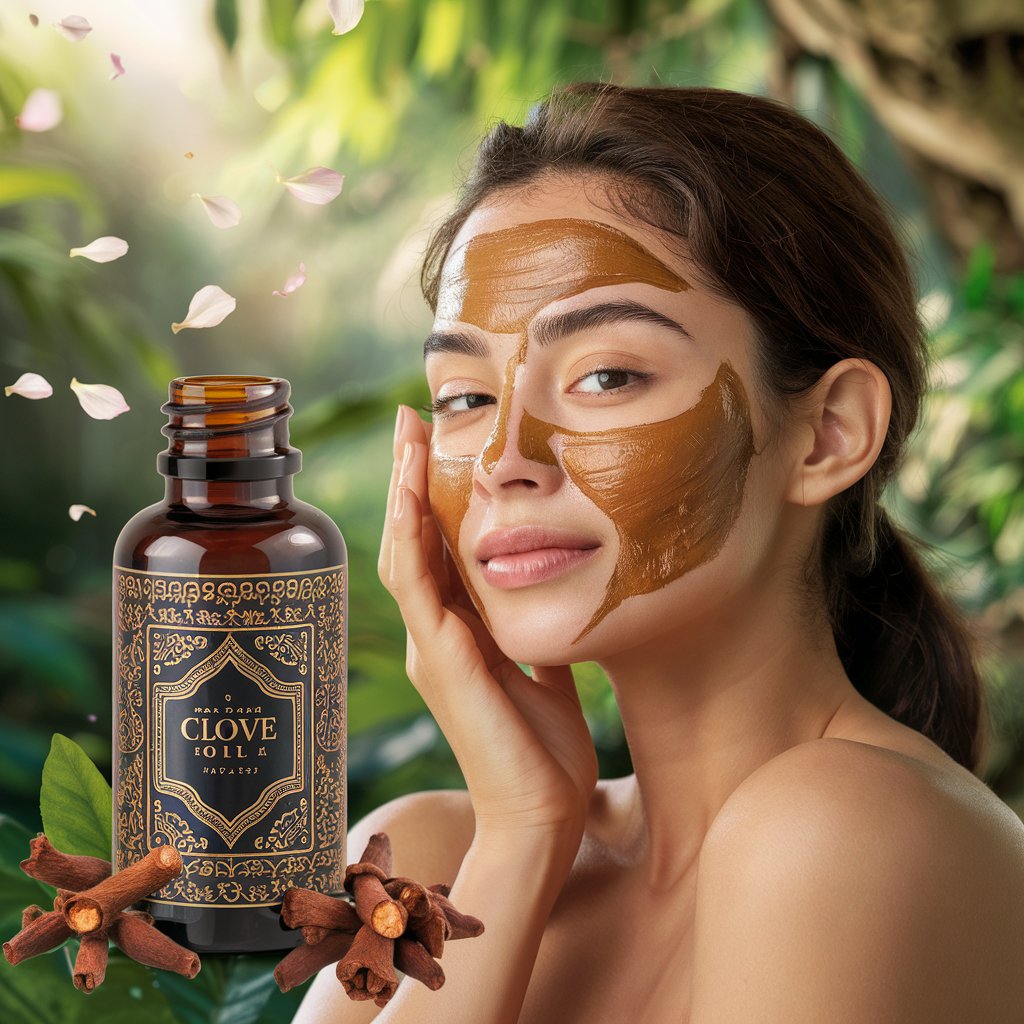2. The allure of natural skincare solutions has led many to explore the benefits of clove oil, especially for skin lightening.
However, while clove oil is often praised for its potential to improve skin tone, users must be aware of the risks associated with its use, including the misconceptions surrounding clove oil for skin whitening.
This article delves into the scientific evidence, expert opinions, and user experiences regarding the use of clove oil for skin lightening.
Clove Oil and Skin Lightening: The Hype and the Facts
In addition to understanding the potential dangers, it’s essential to learn how to use clove oil effectively, such as by incorporating a clove oil face mask for whitening into your skincare routine.
By doing so, you can make informed decisions about your skincare and avoid any adverse reactions.
Clove oil is often touted for its potential to lighten dark spots and even skin tone, primarily due to its main active compound, eugenol.
Eugenol is known for its anti-inflammatory and antibacterial properties, which can help improve overall skin health and provide several benefits of clove oil for skin.
Studies have shown that eugenol has the ability to inhibit the growth of bacteria and fungi, which could theoretically reduce skin issues that contribute to hyperpigmentation[1][2].
Despite these potential benefits, it is crucial to note that the effectiveness of clove oil for skin lightening is not well-established in scientific literature.
Most studies focus on its antimicrobial properties rather than its ability to lighten skin.
Related: Natural Skin Lightening Ingredients You Never Knew Could Lighten Skin
Dermatologists’ Perspectives
Dermatologists are generally cautious about recommending clove oil for skin lightening.
Dr. Janelle Vega, a board-certified dermatologist, warns that while clove oil can have some beneficial skin whitening properties, it can also cause skin irritation
“The concentration of eugenol in clove oil can be quite high, and undiluted use on the skin can lead to severe irritation,” she notes.
Furthermore, the U.S. Food and Drug Administration (FDA) has not approved clove oil for skin lightening purposes.
This lack of regulation means that users cannot be sure of the safety and efficacy of clove oil products marketed for this purpose, including those claiming to be among the best essential oils for skin lightening [4][5].
User Experiences
Anecdotal evidence from skincare forums and user reviews offers a mixed perspective on the use of clove oil for skin lightening.
Some users report positive results, noting a reduction in dark spots and a more even skin tone after consistent use.
For example, one user on a popular skincare forum stated, “I’ve been using diluted clove oil on my dark spots for a few months, and I’ve noticed a significant improvement.”
However, other users report adverse effects, such as redness, burning sensations, and increased skin sensitivity.
“I tried clove oil for my acne scars, but it made my skin so irritated that I had to stop using it,” shared another user.
Safety and Recommendations
Given the potential risks, it is essential to use clove oil with caution and explore natural remedies for skin lightening.
Here are some recommendations for those considering clove oil for skin lightening:
Dilute Properly: Always dilute clove oil with a carrier oil, such as coconut or jojoba oil, before applying it to your skin.
A common ratio is one drop of clove oil to five drops of carrier oil.
This is especially important when using clove oil for melanin reduction, as high concentrations can cause irritation.
Patch Test: Conduct a patch test on a small area of your skin to check for any adverse reactions before applying it to larger areas, as undiluted clove oil can exacerbate hyperpigmentation treatment attempts.
Consult a Dermatologist: Seek advice from a dermatologist to ensure that clove oil is appropriate for your skin type and condition. They can help you determine the safest and most effective way to use clove oil in conjunction with other treatments.
Comparing Clove Oil with Other Skin Lightening Ingredients
When it comes to skin lightening, clove oil is just one of many options. Here, we compare it to other commonly used ingredients:
Hydroquinone:
Hydroquinone is a widely used skin-lightening agent that works by inhibiting melanin production.
It is effective but can cause side effects like ochronosis (a bluish-black discoloration of the skin) and has been banned in some countries due to safety concerns[10].
Anti-aging benefits can be achieved through the combination of hydroquinone and other skin-lightening agents.
Kojic Acid:
Derived from fungi, kojic acid is a popular alternative for lightening dark spots and hyperpigmentation.
It works by inhibiting the enzyme tyrosinase, which is involved in melanin production. Kojic acid is generally well-tolerated but can cause skin irritation in some individuals[11].
Antioxidants for skin, like kojic acid, can neutralize free radicals and reduce oxidative stress, leading to healthier skin.
Vitamin C:
Known for its antioxidant properties, vitamin C can brighten the skin and reduce the appearance of dark spots.
It is less likely to cause irritation compared to clove oil and other stronger agents, making it suitable for sensitive skin.
Niacinamide:
Also known as vitamin B3, niacinamide can lighten dark spots and improve overall skin tone.
It is well-tolerated by most skin types and has additional benefits, such as reducing inflammation and improving the skin barrier.
DIY Skin Lightening Recipes with Clove Oil
For those who prefer DIY skin whitening treatments, here are some recipes that incorporate clove oil along with other skin-lightening ingredients:
- Clove Oil and Honey Mask:
- 1 tablespoon of honey
- 2 drops of clove oil
- Mix together and apply to the face. Leave on for 15 minutes and rinse off with warm water. Honey has antibacterial properties and can help soothe the skin, and its antioxidant properties can help fight antioxidants for skin damage.
2. Clove Oil and Lemon Juice Spot Treatment:
- 1 teaspoon of lemon juice
- 1 drop of clove oil
- Apply the mixture to dark spots using a cotton swab. Leave on for 10 minutes and rinse off. Lemon juice can help lighten dark spots but can also increase sun sensitivity, so use sunscreen afterward.
3, Clove Oil and Aloe Vera Gel:
- 1 tablespoon of aloe vera gel
- 2 drops of clove oil
- Mix well and apply to the face. Leave on for 20 minutes and rinse off. Aloe vera has soothing properties and can help reduce skin irritation.
How to make clove oil for skin lightening
Making clove oil at home is a simple process that requires only a few ingredients and tools.
Here’s a step-by-step guide to create a natural diy skin whitening treatments that can help you achieve your desired skin tone.
Ingredients
- 1 cup of whole cloves
- 1 cup of carrier oil (such as olive oil, coconut oil, or almond oil)
Equipment
- A clean, dry glass jar with a lid
- A mortar and pestle or a spice grinder
- A cheesecloth or fine strainer
Instructions
By using clove oil consistently, you can experience anti-aging benefits such as reduced fine lines and wrinkles, resulting in a more radiant and youthful appearance.
-
Prepare the Cloves: Start by grinding the whole cloves using a mortar and pestle or a spice grinder. You want to break them down to release their oils but not turn them into a fine powder.
-
Combine with Carrier Oil: Place the ground cloves in the glass jar and pour the carrier oil over them. Ensure that the cloves are completely submerged in the oil.
-
Infuse the Oil: Seal the jar tightly and place it in a cool, dark place. Allow the mixture to infuse for about two weeks, shaking the jar gently every day to mix the contents.
-
Strain the Oil: After two weeks, strain the oil using a cheesecloth or fine strainer to remove the clove particles. Transfer the strained oil to a clean, dry bottle for storage.
-
Storage: Store the clove oil in a cool, dark place to maintain its potency. It can be used for up to six months.
Using Clove Oil for Skin Lightening
To use clove oil for skin lightening, it is essential to dilute it with a carrier oil to avoid irritation. Here are some tips for safe application:
-
Patch Test: Before applying clove oil to your face, conduct a patch test on a small area of your skin to check for any allergic reactions.
-
Dilution: Mix a few drops of clove oil with a tablespoon of carrier oil. You can use oils like jojoba, argan, or rosehip, which are also beneficial for the skin.
-
Application: Apply the diluted oil to the affected areas using a cotton ball or your fingertips. Massage gently and leave it on for 15-20 minutes before rinsing off with lukewarm water.
-
Frequency: Use this treatment 2-3 times a week to see noticeable results.
Quick facts:
Benefits of clove oil for skin:
Clove oil contains eugenol, which has anti-inflammatory and antimicrobial properties, making it beneficial for treating acne and reducing skin infections ➍, ➑.
The oil is also rich in antioxidants, which can help in maintaining the collagen balance of the skin, potentially preventing wrinkles and signs of aging ➋.
Potential side effects:
While clove oil can be beneficial, it is important to use it in small quantities as overuse can lead to skin irritation and allergic reactions ➍, ➑.
Scientific studies on clove oil:
Research indicates that eugenol, a major component of clove oil, can help with acne treatment due to its antimicrobial properties ➊.
Clove oil’s role in nanotechnology for skincare highlights its use in creating stable, controlled-release formulations that enhance skin penetration while maintaining safety ➑.
Alternative uses of clove oil:
Apart from skincare, clove oil has been traditionally used for oral health, particularly for toothache relief and gum infections due to its pain-relieving properties ➏, ➎.
Conclusion
While clove oil may offer some benefits for skin lightening, it is important to approach its use with caution due to the potential risks and side effects.
Comparatively, other ingredients like hydroquinone, kojic acid, vitamin C, and niacinamide offer alternative options with varying levels of effectiveness and safety profiles.
Always consult with a dermatologist before starting any new skincare treatment, especially when it involves potent ingredients like clove oil. Proper dilution, patch testing, and professional guidance can help mitigate risks and ensure the best outcomes for your skin.

I’m a devoted organic skincare enthusiast, passionate about the natural, wholesome goodness that organic products bring to our skin.
Organic skincare isn’t just a hobby for me—it’s a lifestyle. Every product I use, recommend, and write about has been carefully chosen for its purity and effectiveness. Everything I write about is backed by scientific studies, dermatologists’ opinions, and user experiences.
I also excel at tackling skincare challenges with innovative, organic solutions.


